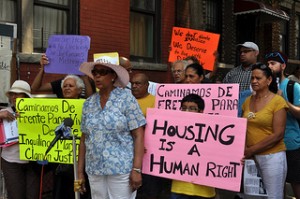Your community’s housing conditions are in crisis. Too many landlords ignore codes. They disregard tenants’ concerns. And their properties are hardly habitable. But they continue to collect rent—from tenants with little capacity to protect themselves.
So your local government fashions an innovative program, one that empowers tenants. It allows tenants living in troubled properties to withhold a portion of their rent and to use it for needed repairs.
Landlords sue. They claim that your program violates their federal substantive due process rights. Do they have a winning constitutional argument?
Not according to the Ninth Circuit, which ruled Monday in Sylvia Landfield Trust v. City of Los Angeles, No. 11-55904, slip op. (Sept. 9, 2013), that the City of Los Angeles’s Rent Escrow Account Program is constitutional.
The court made quick work of the landlords’ substantive due process claim, holding that the City’s program is “rationally related to a legitimate governmental purpose.” The court explained:
By allowing tenants to pay a reduced rent into an escrow account to be used to repair their landlord’s uninhabitable property, REAP addresses the health and safety problems created by substandard housing and encourages landlords to prevent those problems. . . . These are legitimate goals.
The court rejected the landlords’ argument that the City had improperly placed their properties into the program. It determined that placing property into the program because of the circumstances at issue—improper weatherproofing and constructing without required permits—was rationally related to the program’s goals. The court also found that the City could rationally use third-party contractors, including four non-profit organizations, to administer the program.

